Fading Into Bolivian
Lake Titicaca!
Lake Titicaca!
Go ahead and say it aloud with me. You know you want to.
LAKE TITICACA!!!
I spent the majority of the day along the lake, though sometimes farther away, so I couldn’t see it. I managed my way through Puno, another large town, then cruised the rest of the day. Mostly flat, near-perfect weather. Awesome.
I had thought that maybe I would find some empty spot along the shore and wild camp by the lake, but those thoughts were dashed. All along the lake resembled the never-ending outskirts of a town. Houses almost everywhere, and all the land was clearly privately owned, usually being used for farming, sometimes for grazing.
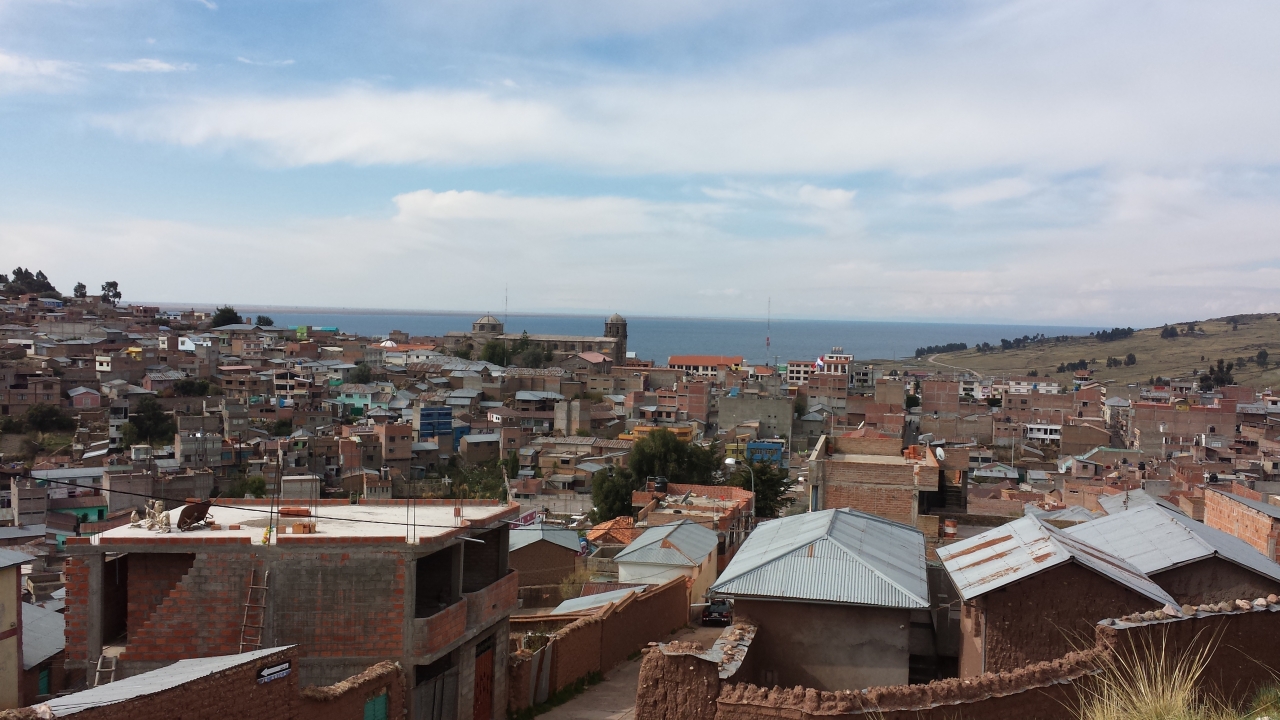
I was glad when people stopped shouting "Gringo" at me after Central America, but it's reared its ugly head again. I don't know what people are thinking down here, but "GRINGO GRINGO GRINGO!" is not how to start a conversation, nor is it polite. Now that my vocabulary is a little better, I've sometimes taken to responding with, "Please, do not call me 'Gringo.' It is offensive/not polite." I'm more likely to do this with kids, because maybe they don't know any better, and I feel like adults are less likely to change. And I'm hoping that maybe there will soon be a generation of nice people down here.
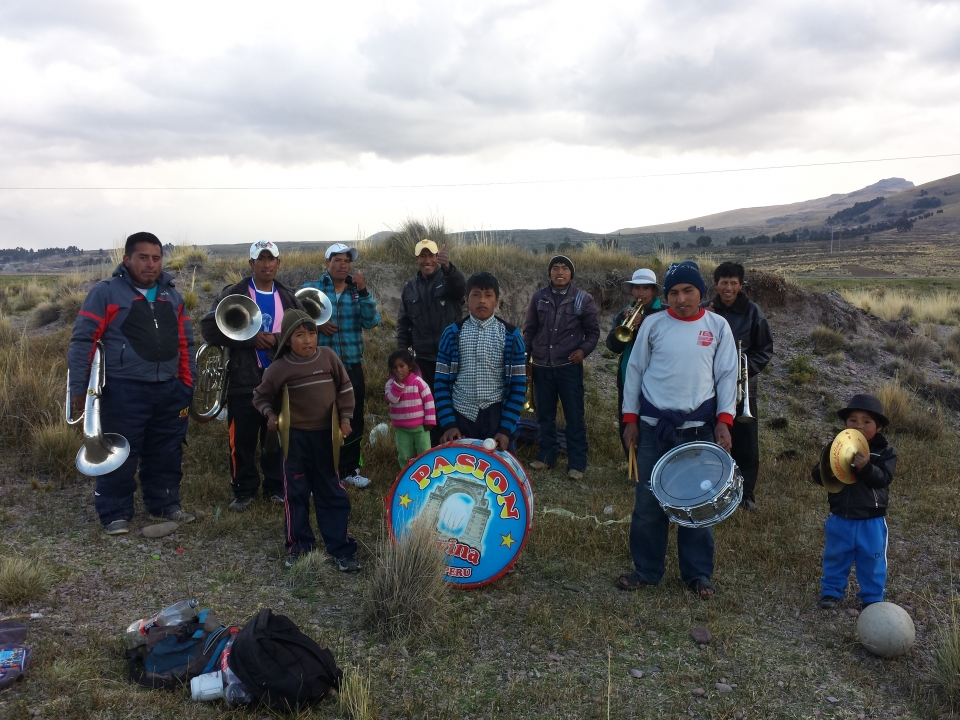
I eventually made it to a small town, only about 30-45 minutes before dark. It was my last night in Peru, so I decided I'd splurge on a hotel, a good dinner, and probably a beer. I don't like carrying a lot of cash across a border, because when you change currency, you always get ripped off. If I had less, at least I would get ripped off by a smaller amount. And if I'm going to lose the money anyway, I might as well enjoy it.
There was some kind of fiesta going on in the plaza, and a lot of people around. A group of three flagged me down.
"Do you want some water?" They were holding beers.
"That's not water..." A few people around laughed.
The guys gave me a small amount of beer and asked me the standard questions. As soon as I mentioned Argentina, two of them repeatedly told me they know an Argentinian soccer player. They leaned in a lot when they talked, almost like they wanted to touch me. They were clearly drunk. Somehow it came out that I speak French, and one of them felt it necessary to tell me that Napoleon Bonaparte was from France. And it was also important to tell me this five or six times.
Another guy walked up. "Do you speak English?"
"Yes I do!"
"Me and my friend saw you with your bike, and we wanted to talk to you."
Turns out this guy, Alejandro, is somewhat of a bike tourist as well, having done a few week-long trips with his friend and/or cousin. Alejandro had an art museum in town and invited me to stay with him.
"It is my dream to one day have a place where all cyclists can stay." I tried explaining WarmShowers to him, but he insisted the site wouldn't work in Peru (it does).
Alejandro, his friend, and I went to dinner together. His friend was carrying a bamboo stick about 6 cm thick and almost as tall as he was. He explained that it was for the frame of a kite he was going to make soon. The plan was to split the bamboo pole into long, thin sections, all slightly curved.
As it turns out, November 1 is a day that the locals celebrate the dead, and they do so by flying a kite. The idea is to show that their spirit is still soaring, and now they are in the heavens. Last year, Alejandro's friend's kite flew higher than anyone else's, even going into the clouds, but he lost grip on the string and the kite was gone.
While we were at dinner, it started raining - hard. Alejandro told me it's a common occurrence this time of year: rainy at night, cold in the morning, warm and sunny in the afternoon. It was now the beginning of rainy season, and in a month's time, it'll rain day and night. Glad I'll be gone by then.
Alejandro went on to explain that the dry air from the mountains sometimes hits the moist air from the lake, and the two create a vortex in the clouds, sometimes creating a tornado. The exact same way it happens on the American Great Plains. Only here, the tornado usually forms over the lake, and after it's done, fish fall from the sky. Raining fish, almost sounds like one of the Biblical plagues.
Strangely enough, many people here believe that aliens frequently visit the lake, and some have claimed to have seen a flying saucer fly down from the sky and into the lake, presumably to visit an underwater city.
As we walked back to Alejandro's place, I mentioned that people keep calling me "Gringo," and that in Texas, it's sometimes considered offensive.
"It's what we call all foreigners here. What would you want to be called instead?"
"Robert."
I don't know why I didn't say it at the time, but my thought is, why call me anything? Why is it necessary to point out that I'm different? Even if it's not technically racist or not used as a slur, it's still impolite. I never start a conversation with "Hey you, black guy" (my experience would be closer to "BLACKIE BLACKIE BLACKIE BLACKIE!!!"). Sure, it might in fact be a black guy, but there's no need to mention it at all. Eventually, I’d get my ass kicked. But the most important reason I don't do that is because it's not nice.
If you need to call someone anything, "sir" or "ma'am" or "I'm ____, what's your name?" does the trick.
Like Geovanni, Alejandro led me out of Pomata, and continued to ride with me for the first 15 km of the day. I'd wondered which way I should go: the direct way, or the longer way. The longer one would lead me to one of the most famous beaches on Lake Titicaca, and would also bring me closer to the Island of the Sun. The shorter way was a lot flatter, and would include what Alejandro described as the best ruins in the area. I took the shorter route.
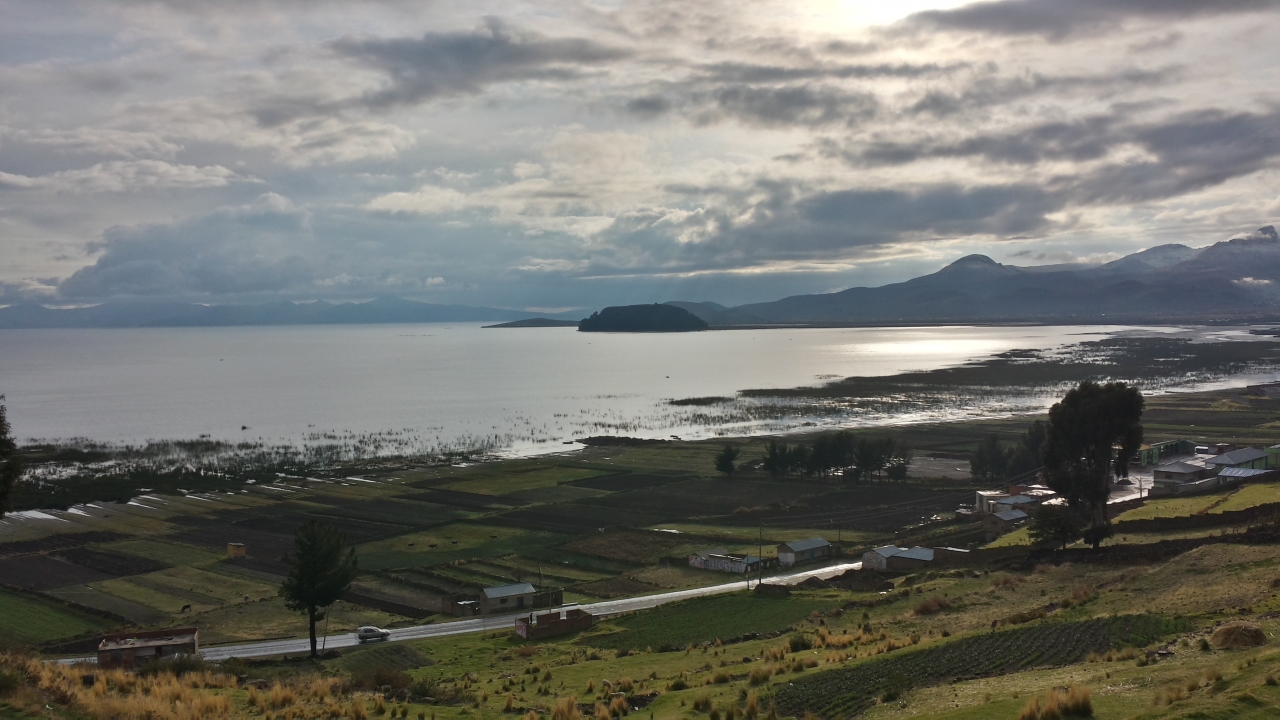
Later in the morning, I saw rain clouds hanging over the beach and island area. I didn't get a drop. Good call.
Before crossing the Bolivian border, I still wanted to blow some money rather than exchange it, so I had an early lunch of fried trout. Someone had told me that I should try it in the mountains in Peru, and if I could remember who it was, I'd have half a mind to turn around and ride all the way back just to thank them. I wound up meeting a group of Slovakians - thirty of them! - of various ages, and after telling a couple of them about my ride, I now have a place to stay in Slovakia, if I wind up going there.
After getting stamped out of Peru (you have to go through immigration both in and out of every Latin American country), I got in the short line at the Bolivian immigration.
"You need a card," the guy said, holding up a green piece of paper.
"OK." I held out my hand.
"No, from over there."
I walked over to the other window. "I need a card."
"You are from United States?"
"Yes." He walked off for five minutes. I could see the stack of green papers. He finally came back and handed me one. "Do you have a pen?" I asked
"No. Over there." He pointed at some people that were filling out their own form with their own pen.
I emptied one of Valeria's bags and found the pen I keep near the bottom. A simple thing, but one of the things I use the least, so it stays at the bottom, and it's a hassle to get it out. I filled out the form, like I usually have to for Latin American countries. Like always, there was nothing on it that they couldn't find out from looking at my passport. I'm not sure why these are required, because I could write anything I wanted on it. They never ask a single question to double-check, and only one country (Mexico) has bothered to ask what's in my bags.
With my form now filled out, I waited in line once again, only this time it was much longer and took about half an hour.
"You need a visa."
"Yes, I know."
"Over there." He pointed to yet another window.
Is there some reason this couldn't all be done at the same window?
At the window for the visa, the first thing the guy said was a demand for $135.
"135 dollars?!?"
"Yes."
"I don't have 135 dollars! I might have 135 soles..."
"We need 135 dollars."
"What happens if I go?" The office didn't have a gate; you essentially walk in from the street, voluntarily, and when you leave, no one checks if your passport has been stamped.
"When you go to La Paz, the police will check your passport."
"I'm not going to La Paz." He fell silent, like this surprised him. Apparently an overcrowded city is the only thing the entire country has to offer. "Do you accept credit cards?"
"No."
"This is a government office and I can't use credit cards? Is there an ATM?"
"In Peru." I would have to ride back into another country, withdraw a crapton of money, then cross the border again to stand in line one more time.
"It costs over $100, you don't accept credit cards, there is no ATM nearby, and I have to go to three windows to enter the country once. Do you think this is intelligent?"
No answer. I left.
I strongly considered skipping out, like I'd threatened, but then Bolivia wouldn't stamp me out of their country. Not that I care, but then maybe Argentina wouldn't let me in. That’s probably the reason you have to do both.
I was angry enough that I even considered skipping Bolivia altogether and going straight to Chile instead. But that would add to the distance, making me finish later, and I'm still trying to finish before Christmas. And taking longer means I'd probably spend the same $135 anyway, but at least I'd do it by choice.
After finding an ATM a few blocks into Peru, I came back.
"My passport, my form, and your ransom." I laid them all on the desk.
They made me fill out yet another form, nearly identical to the one I'd already done. Apparently this was for a five-year, multiple-entry visa, whereas the first form was for a 90-day visa. I did my best to explain that I would only be in Bolivia for eight days, but they wouldn't have it. They refused to return my passport until I filled out yet another form.
Every so often, I heard employees mumbling to each other (they were rarely helping anyone). I couldn't hear everything they said, but "Americano" came up frequently.
Visa finally in hand, I waited in line one more time for the main window to get my passport stamped.
"We need a photocopy of your passport."
"A copy?"
"Yes, we need a copy."
"If I have a son, do you need it too?"
"We need a copy."
"Make one."
"You need to make one and return."
I was not about to go and run another errand for them, nor stand in line again. I just so happened to already have a photocopy of my passport.
"I have a copy, but it is for emergencies. This is the only country that needs a copy, and a ransom of kings. Why is it complicated and difficult?"
I handed them my photocopy and they finally stamped my passport. I reached to take it, but they didn't hand it back right away.
"We need another copy."
"Two?!?"
"We need a copy of this page, with the visa on it." He held up the page with the stamp and the visa sticker.
"This is my visa, correct?"
"Yes."
"Then I don't need to do anything." I wheeled Valeria out the door. I turned around as I left and added, "You are criminals."
All told, this took an hour and a half. I had been hoping to cover long distance today. Maybe not anymore.
Bracing myself, I found a moneychanger outside and exchanged what little was now left over (only after a huge withdrawal). To my surprise, he gave me a good rate, only taking about $1 out of $20.
It wasn't until later that I did the math in my head and realized that the immigration office had intentionally given me incorrect change, ripping me off for another $30 or so.
I decided from then in that I would avoid spending any money in Bolivia. First off the list was the ruins that Alejandro recommended. I also decided to get out of this country as quickly as possible.
Fueled by anger, I barrelled down the mostly-flat highway towards La Paz, surprised at how little traffic there was. This was almost the only highway connecting Peru to Bolivia, and La Paz was only 100 km from the border. Where was everyone?
Earlier than expected, I made it to the town where I'd turn off the main highway and away from La Paz. In the main plaza, there was a huge crowd, most people in traditional dress. It turned out to be the anniversary of the founding of La Paz, and apparently the entire country celebrates. Never have I heard of that before. Other states don't even notice Texas Independence Day, and we're an entire state. In fact, at that time, we were a country!
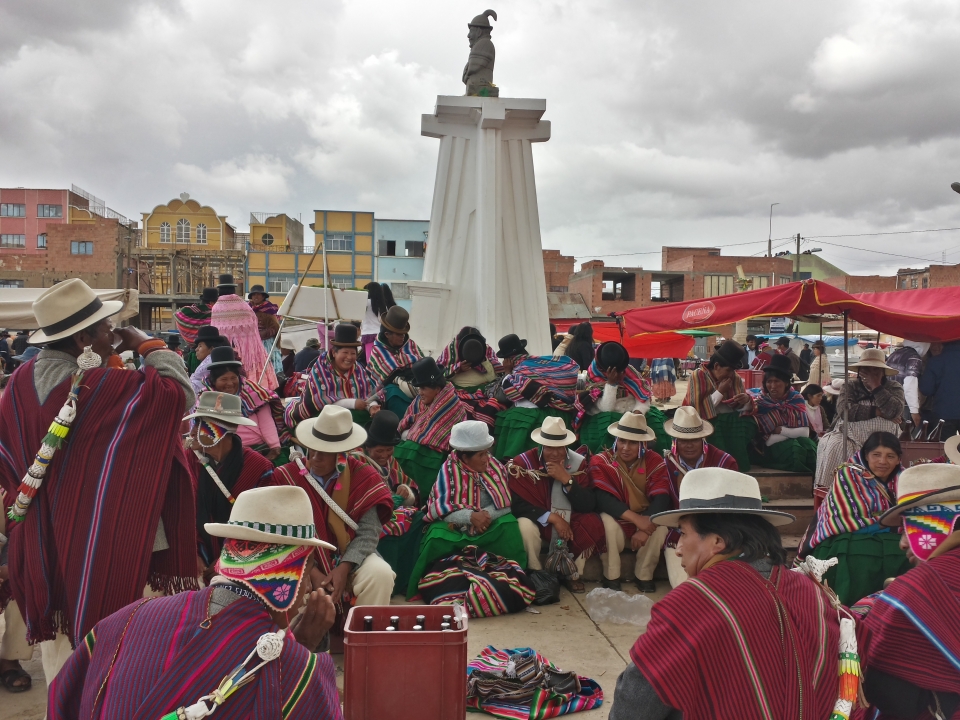
15 km separated me from my destination. None of them were paved. The road was mostly packed dirt, but was uneven and had large rocks sticking out of it everywhere. After only about 1 km, it turned into the dreaded washboard surface, where there's a huge bump every 50 cm. Valeria shook constantly, but otherwise handled it well.
Then it started raining.
The road was already worse than the Dalton Highway's dry parts, and now was worse than the muddy parts. On the Dalton, the mud was thick and sticky and eventually covered everything, but it was rideable. This mud could best be described as slippery. Valeria started sliding all over the place, and at one point, it was impossible to maintain traction. The slightest pedaling and the wheels would spin in place. I got off and walked for at least 1 km, taking almost an hour.
If not for the ordeal at the border, I could've made it through before the rain started.
The last 6 km or so into town were a little better; sometimes the tracks left by truck tires were firmer and easier to ride on. I was almost within city limits when all of a sudden, I had zero pedaling resistance. I'd dropped my drive belt. No problem, would just take a second to put it back on. I looked down.
Where is it? I looked behind me. There it was, lying in a serpentine position in the mud. It was no longer a loop. I'd snapped the drive belt.
I had a replacement, but installing it would take some time, and I had an hour of daylight left, at most. It's also a job where you wouldn't want to get dirt in certain places. Trying to fix it on the side of a muddy road, with no guarantee that it would stay light long enough to finish working on it, didn't sound like a good idea. With only 1 km to go, I walked it in.
I had intended to camp that night (avoid spending money in Bolivia), but a hotel room where I could work on Valeria in a clean, well-lit environment was a good idea. I just went to the first one I found, and was mildly surprised that they had no reservations on letting me right in, and Valeria as well, even though both of us were covered in mud.
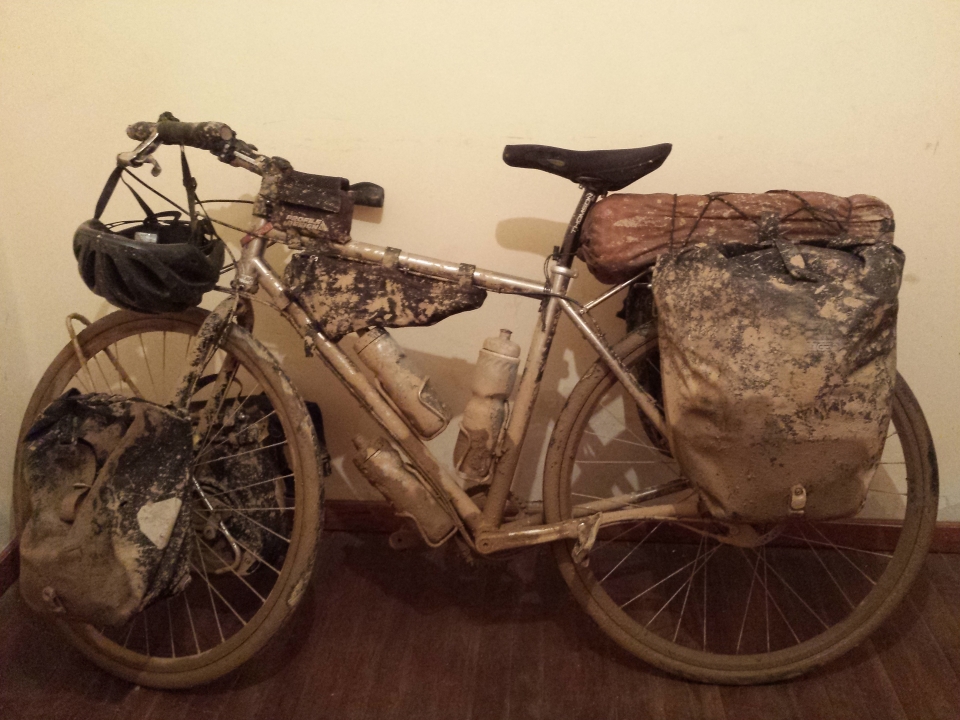
The place didn't have a shower, not even a cold one. Normally I wouldn't mind, but I was covered in dried mud and wanted to rinse it off.
I managed to replace the belt. Pulling the spare out of my bag, I was surprised at how strong and stiff it was, though I quickly remembered that's how the original used to be. When I installed it, the tension was way too high and I had to dial it back a little bit. Is it possible for these drive belts to stretch?
I didn't hear any rain overnight, so I hoped that there hadn't been any overnight and then would start on dry roads. When I stepped outside in the morning, I found out why: it was snowing.
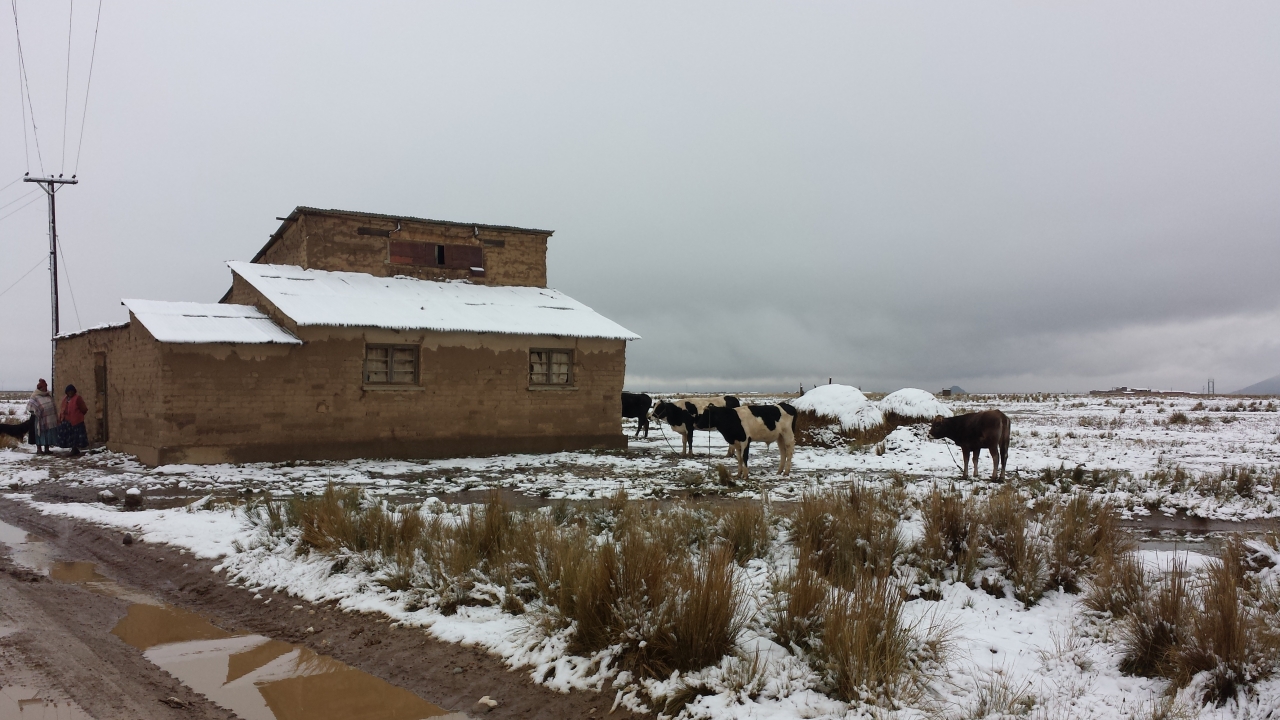
Snow, whether you're biking or hiking, is your worst enemy. First it has to melt, and then it has to evaporate, which happens slowly in cold air. I had to do another 12 km off-road, at a minimum, to start the day. The snow did not please me.
The road I had to take was only one lane wide, clearly a tiny farm access road. At one point, a cab passed me and I flagged it down just to make sure I was going the right way to make it to the paved highway as soon as possible. They assured me that I was.
I wasn't. The dirt roads in the area were a veritable maze, until I was guided onto a slightly wider, more well-built one, which would guide me straight to Oruro, more than a day from now. As much as I appreciate straight lines, pavement is better. The offline maps I had proved useless, as I wasn't even on a dirt road, at least according to my map, all morning.
A local farmer finally pointed me due east, on the shortest path to the main highway. The snow had mostly melted by that point. I managed to handle what was left. 5 km before the highway, I could see trucks moving slowly, up on some invisible platform ahead of me. Able to see my goal, I sped up as best I could on the surface I was on. I'm not sure if I've ever been as happy to see asphalt (the Dalton Highway might win, not as bad, but much longer). The amount of mud stuck to Valeria at that point was comical.
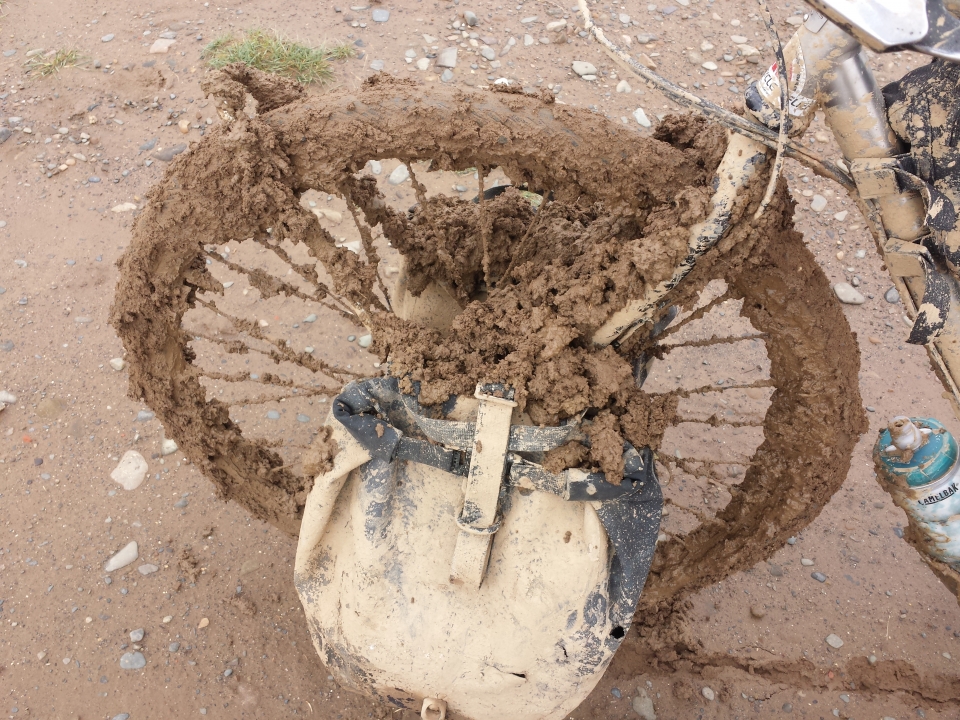
All told, it took me three hours to move less than 12 km, as the crow flies.
I did my best to get in a groove on the highway. Surprisingly, it was well-paved. It was currently one lane each way, but was also in the process of becoming a divided highway, two lanes in each direction.
Left or right, whichever side wasn't finished, traffic was guided to the other side. I stayed to the right either way, avoiding any and all traffic half the time. In almost no circumstances were the closed sections unfinished; 95% of the time, both lanes in both directions were rideable. I couldn't figure out why they were willing to almost finish the highway for well over 100 km at a time, but had absolutely none of it open in both directions.
I kept looking at my shifter. I don't use a spedometer, so I generally gauge how fast I'm going by what gear I'm in. I felt like I wasn't moving quickly, but my shifter kept telling me I was in a relatively high gear. I looked around. There was hardly anything there. Maybe that's why I felt slow; because there were few points of reference? I looked behind. There were no true climbs, but it was clear that what looked like flat going forward had been an incline for a long time.
My shifter was acting a little funny, most notably, it generally settled in where the gear indicator was pointing dead-center between two existing gears. Also, I no longer had my two highest gears. Similar behavior happened a day or two before the shifter cable snapped the last time. I prayed it didn't happen again. I might not be so lucky with a high-end shop within the same city limits where it breaks, and apparently, it requires a special tool. If it snaps, that could be the end of the tour.
I'm finally starting to notice a difference in when it gets dark. It doesn't get truly dark until 7:00 PM or so, meaning I can keep riding until about 6:30, provided I know I have a place to stay. It starts getting cold in the last hour of daylight, which serves as a reminder that I better start looking.
I only managed 113 km before I camped out behind some tractors, after asking the construction workers if it was OK there. I was disappointed that today was when I was supposed to catch up, and I wound up getting even a little farther behind.
I heard rain hitting my tent during the night, and woke up hoping that it washed Valeria off a little bit. Nope.
The construction workers had said they wouldn't even be there before 8:00 AM, and if I left before that, there was no problem. They were there at least as early as 6:00 AM and felt the need to give me a wake-up call. When I hit the road an hour later, they still weren't working on anything.
Finally all paved, and mostly flat, I made good time all day. When I got to Oruro, the largest town I'd visit in Bolivia, there was a human roadblock on the north side, where I was coming from. Based on what I could read on their signs, they were protesting the fact that a lot of pedestrians have been killed by traffic. I guess I was glad someone's pointing out how bad the drivers are here.
I intended to avoid going to the center of Oruro, instead going around on a loop that circumvents the city. When I got to the intersection with the loop, the roundabout was under construction, and a sign pointed me to the right. If I went that way, I'd have to go around about 70% of the city, rather than 30% the other way.
I stopped and asked someone if following the sign and turning right was the way south to Popoo. He agreed. I asked someone else if I went the exact opposite direction, is that the way south to Popoo. He agreed. If I had to rely on people for directions in Latin America, I'd probably still be doing circles in Mexico.
Less than half the streets I used in Oruro were paved (no matter how many people told me they'd be paved). Still, I was glad to have skipped most of the mess that comes with large cities. With my last major Bolivian city firmly in my rear-view mirror, I headed south, again in a good mood.
The sun came out, and it even got kind of warm! Oruro must have been at some kind of geographic boundary. Not much later, I wound up talking to a motorcyclist from Arizona named Jeff. He was doing the Pan-American thing like me, but he does it in sections. He warned me that in Potosi, it's cold and rainy. I hadn't planned on going that way anyway, but that information cemented it. My way south, about the same distance, would use another highway.
Late in the day, ominous clouds started rolling in from the direction of a nearby lake. Then the wind picked up, bigtime. It was more cross wind than anything, but was slightly behind me, giving me a small boost. The clouds approached quickly, until they covered all of the sky except for what was ahead of me and a little to the right. I did my best to maintain a fast pace, trying to get out from under the clouds and beat the weather in.
Flat #10. Rear tire, piece of wire. I was less than pleased at the delay. But in the process, I noticed something odd about how the external gear mech was mounted on the hub. Maybe that's causing the shifting problem? Maybe it has nothing to do with the cable! I fiddled with it, and got a result: I no longer had my two lowest gears. But at least I knew what the problem probably is, and maybe had an idea how to fix it.
I got lightly sprinkled on at one point, but just barely made it out ahead of the weather. I turned around and looked behind me. That area getting nailed. My original destination was back that way, 30 km. Had I stayed there...
The first thing I saw in Pazña was a place called "New Vision," with a cross on the sign and a lot of motorcycles out front. Was it a church, maybe with a contemporary approach? And could/would they help me? I decided to go in and find out.
There were even more motorcycles parked inside the building. I asked if I could sleep on the floor, and after talking to a couple different people, one said I should follow him and he'd take me where I could stay.
We walked at least a block. I was expecting this place simply had another building, but he instead took me to a restaurant/lodging owned by a family he knew. I would be staying for free. It wasn't much (a room with a bed in it and that's it), but it was more than I asked for! On top of that, the family invited me to dinner! Rice, beef, and a fried egg. Not bad! The patriarch of the family had once been a musician. The matriarch ran the restaurant during the day, it seemed.
Afterwards, I hung out in my room and listened to music for about an hour. Good end to the day.
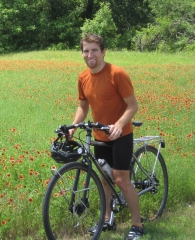


 June
June

